Yrvanie Joseph was the valedictorian and president of her tiny senior class at Avon Middle High School, a “choice” school she attended while growing up in Randolph, Massachusetts.
She excelled academically even while working between 30 and 40 hours a week at Dunkin’ Donuts, starting her sophomore year of high school. Her younger brother was ill and her mother needed to stay home to care for him. Her family needed the money – and so did she.
“I knew that if I had to pay for college, it would be on me. My family is low-income,” she says. “I knew that, going into college, I did not want to work as much so I could focus on academics.”
So when the UMass system granted her a John and Abigail Adams Scholarship to attend a state university and UMass Lowell offered her an Immersive Scholarship, good financial aid and admission to the Honors College, she decided it was the most practical choice. A campus welcome day for prospective engineering students helped, too.
“When I did visit Lowell, I felt like it was a school for me,” she says. “UMass Lowell looked very modern, and a lot of Boston schools looked really old.”
After she made her decision, things began to fall into place. Joseph, who planned to major in biomedical engineering, heard from a friend about a brand-new summer program for incoming women engineering majors. Joseph applied to RAMP (Research, Academic and Mentoring Pathways) and attended the six-week, on-campus program, earning six credits and meeting other women students as well as faculty, staff and alumnae.
During RAMP, she decided to switch her major from biomedical engineering to plastics, thinking it would give her a broader scope.
“That program jumpstarted me; I felt more comfortable transitioning into college,” she says. “We visited New Balance, and I saw the machines and I thought they were so cool. I love injection molding: It’s kind of why I went into plastics.”
As soon as fall semester started, she joined the student chapter of the National Society of Black Engineers right away, eager to contribute. She’s now the president, and a close friend she met in RAMP, Shaniya Seney, is vice president.
Joseph also got involved with the Haitian American Student Association and the Black Student Union, as well as BLAC (the Black Leadership Advisory Council) and the Society for Women Engineers (SWE). She became a student alumni ambassador, too.
Her sophomore year, she used her Immersive Scholarship to do research in the lab of Christopher Hansen, an associate professor of mechanical engineering. She worked with graduate students to document the performance of an innovative 3-D printer and help formulate a new plastic for printing.
The following summer, she got a select internship with Proctor & Gamble’s Gillette Division in Boston. She says it was “scary” at first, but she already had a connection through a SWE mentoring program with one of the women who gave her a tour of the facility: Emma Cashman ’19. And, Joseph says, Gillette provided her with a terrific internship mentor, a Black engineer. She also met with other interns in affinity groups for young women and Black students.
“Even though we were in the middle of a pandemic and we had to do everything online, their support system was really good,” she says.
Gillette also gave her meaningful and substantial projects, Joseph says, including improving the software controlling the manufacturing process for a sustainable razor.
“I told them I was interested in sustainability, so they gave me a project on a sustainable razor,” she says. “They gave me a lot of responsibility, but they also gave me a lot of freedom to speak up about my thoughts and ideas.”
She was invited to return for a second internship in summer 2021, but decided to take a break from online classes and pursue a co-op during spring semester 2021. After another company offered her a good co-op, Gillette made an even better offer – a rare opportunity. She took it, and hopes to build a career there after she graduates in spring 2022.
Joseph says that she wouldn’t have been able to take advantage of the opportunities that led her to this point without the generosity of alumni who fund scholarships for students like her. Thanks to those opportunities, she’s on track to graduate without debt.
Just as important, the scholarships are confirmation that others see the value in her hard work and achievements.
“I really am so grateful for the scholarships that I’ve received so far. Because of them, I haven’t had to risk my academics,” she says. “Scholarships validate the work that I do.”


